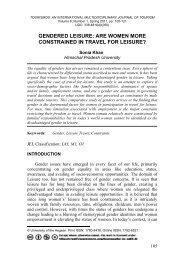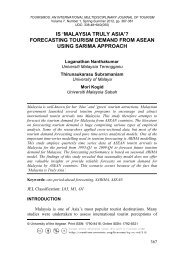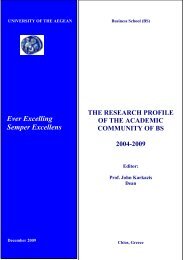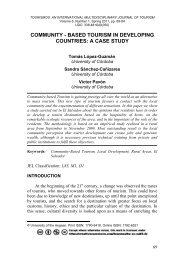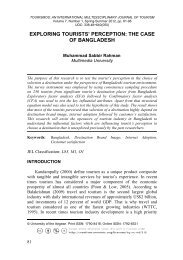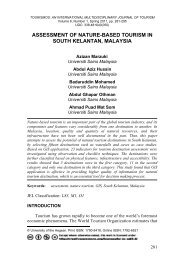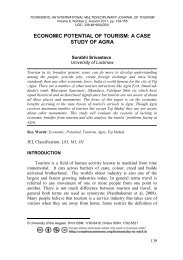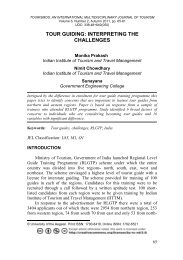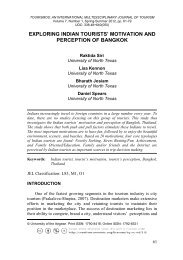TOURISMOS is an international, multi-disciplinary, refereed (peer ...
TOURISMOS is an international, multi-disciplinary, refereed (peer ...
TOURISMOS is an international, multi-disciplinary, refereed (peer ...
Create successful ePaper yourself
Turn your PDF publications into a flip-book with our unique Google optimized e-Paper software.
Mari<strong>an</strong>na Sigala<br />
it also demonstrates how cultural programmes help cities programme <strong>an</strong>d<br />
allocate their resources <strong>an</strong>d efforts to implement events.<br />
Chapter 4 focuses on stakeholder m<strong>an</strong>agement for achieving events.<br />
Cultural programmes require the collaboration <strong>an</strong>d coordination of a wide<br />
network of stakeholders. After identifying the different types of events’<br />
stakeholders, the chapter draws on theories from stakeholder <strong>an</strong>d network<br />
theory in order to <strong>an</strong>alyse <strong>is</strong>sues of leadership, collaboration, partnership<br />
<strong>an</strong>d coordination that are required for implementing events.<br />
Chapter 5 concentrates on the m<strong>an</strong>agement <strong>an</strong>d org<strong>an</strong><strong>is</strong>ation <strong>is</strong>sues of<br />
eventful cities. Specific strategic <strong>an</strong>d tactical m<strong>an</strong>agement <strong>is</strong>sues that are<br />
<strong>an</strong>alysed include: cr<strong>is</strong><strong>is</strong> m<strong>an</strong>agement methods, information systems<br />
functions <strong>an</strong>d m<strong>an</strong>agement. Implementing events also requires fin<strong>an</strong>cial<br />
resources. Th<strong>is</strong> <strong>is</strong> the subject of chapter 6, which focuses on identifying<br />
<strong>an</strong>d <strong>an</strong>alysing the fund ra<strong>is</strong>ing opportunities <strong>an</strong>d sources for supporting<br />
events, such as public sector fin<strong>an</strong>cing <strong>an</strong>d sponsorship. Chapter 7<br />
considers the marketing <strong>an</strong>d promotion aspects of events. Special<br />
attention <strong>is</strong> paid to the following <strong>is</strong>sues: communication <strong>an</strong>d advert<strong>is</strong>ing<br />
tools, the role of media <strong>an</strong>d marketing strategies. Chapter 7 highlights that<br />
the aim of events marketing should be twofold: 1) the promotion of<br />
events in their own right; <strong>an</strong>d 2) the marketing <strong>an</strong>d image making of the<br />
cities themselves.<br />
Chapter 8 d<strong>is</strong>cusses the audiences <strong>an</strong>d publics of eventful cities. The<br />
chapter <strong>an</strong>alyses the following critical <strong>is</strong>sues that a city needs to consider<br />
when developing its marketing strategies (market segments to target,<br />
messages to be developed etc.) as well as its cultural programmes (timing<br />
<strong>an</strong>d type of events to be implemented): the profile of events’ v<strong>is</strong>itors <strong>an</strong>d<br />
particip<strong>an</strong>ts; the motivations <strong>an</strong>d benefits of events’ particip<strong>an</strong>ts; the<br />
experiences of events’ particip<strong>an</strong>ts.<br />
Chapter 9 focuses on measuring the economic, social, cultural <strong>an</strong>d<br />
environmental outcomes <strong>an</strong>d impacts of events. The chapter identifies<br />
different impact assessment methods <strong>an</strong>d metrics to be used. The chapter<br />
also demonstrates the role <strong>an</strong>d reasons for conducting <strong>an</strong> assessment<br />
<strong>an</strong>alys<strong>is</strong> prior the events (for advocacy <strong>an</strong>d deciding whether to stage <strong>an</strong><br />
event) <strong>an</strong>d after the events 9for directing <strong>an</strong>d evaluating policies). Chapter<br />
10 continues the debates about events’ impacts <strong>an</strong>d outcomes by<br />
highlighting the import<strong>an</strong>ce of events’ sustainability for ensuring their<br />
long-term success. Issues d<strong>is</strong>cussed include the bal<strong>an</strong>ce <strong>an</strong>d trade offs<br />
between economic, social <strong>an</strong>d economic sustainability <strong>is</strong>sues.<br />
Chapter 11 elaborates the concept of “keys to success” of events, as<br />
the latter are identified by different stakeholders that participate in events,<br />
such as city officials, political leaders, sponsors, events m<strong>an</strong>agers, urb<strong>an</strong><br />
312



